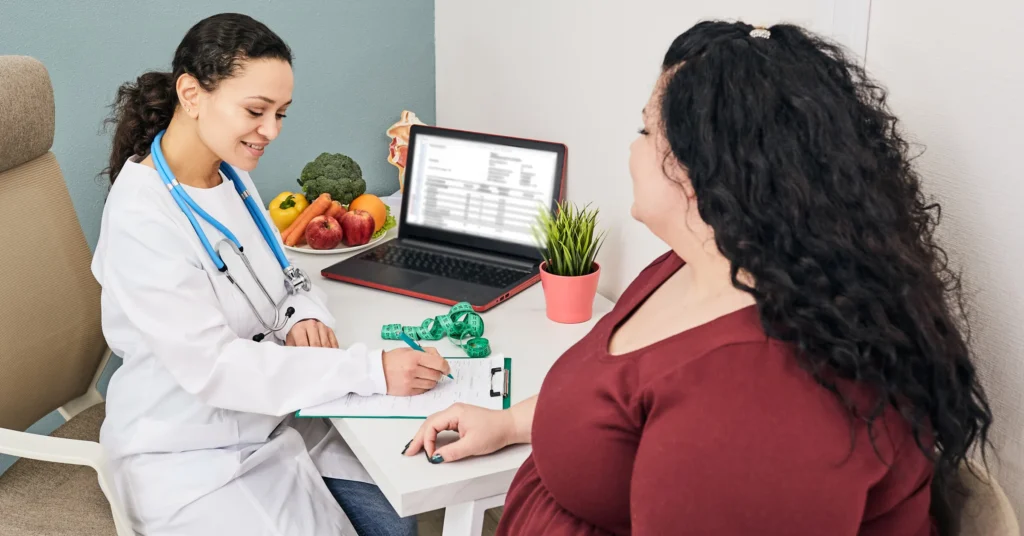Starting a weight loss journey often feels like climbing a mountain without proper gear. While GLP-1 medications have emerged as powerful tools in weight management, they’re not a simple solution. Like any medical treatment, they come with their own set of challenges and considerations that every patient should understand before starting treatment.
Weight management has dramatically shifted with these medications, but success depends on being well-informed and prepared. This comprehensive guide will walk you through what to expect while taking GLP-1 medications, from common side effects to management strategies, helping you make informed decisions about your health journey.
Whether you’re considering starting GLP-1 medications or you’re already taking them, understanding potential effects isn’t just about being informed – it’s about being empowered to navigate your health journey effectively. Let’s explore what you might experience and how to handle potential challenges along the way.
Commonly Reports GLP-1 Symptoms
GLP-1 medications, while effective for weight management and diabetes control, commonly cause digestive system side effects that can impact your daily life. Let me break down the most common stomach issues people experience with these medications:
Nausea is often the first and most common side effect when starting GLP-1 medications – it feels like a persistent wave of queasiness that can make eating and daily activities challenging. Many people say it’s similar to morning sickness or motion sickness that comes and goes throughout the day.
Vomiting can occur with GLP-1s, especially when first starting or after dose increases. While not everyone experiences this, those who do report it’s particularly difficult to manage and can lead to dehydration if you’re not careful about replacing fluids and electrolytes.
Diarrhea is another frequent companion of GLP-1 medications that can disrupt your daily routine with urgent bathroom trips. The loose, frequent stools aren’t just inconvenient – they can drain your body of important fluids and nutrients if not managed properly.
Constipation might seem surprising given the other digestive issues, but it’s actually quite common with GLP-1s. The slowing of stomach emptying these medications cause can lead to feeling backed up, bloated, and uncomfortable.
The good news is that these side effects often improve with time as your body adjusts to the medication. We follow a dosing schedule that aims to reduce potential side effects by starting on a low dose and increasing over time. This “start low, go slow” approach typically begins with the lowest available dose of GLP-1 medication for several weeks, allowing your body to gradually adjust to the medication’s effects before carefully stepping up to higher doses.
Nurse Practitioners Are with You Every Step of The Way
Patients talk with a Nurse Practitioner every 4 weeks to discuss not only progress, but how you’re feeling. We can make suggestions about how to deal with side effects as they come up. Often, we can use over-the-counter remedies, but prescriptions if needed too. These regular check-ins are crucial because they allow us to catch any issues early and adjust your treatment plan in real-time, ensuring you’re getting the support you need when you need it. Having direct access to healthcare providers who understand GLP-1 medications means you’re never left trying to figure out side effects on your own – whether it’s recommending specific anti-nausea medications, suggesting the best timing for taking your medication, or making dietary modifications to help minimize discomfort.
Recommendations To Eat Smaller Meals
We recommend to all patients to follow a healthy diet of smaller, more frequent meals that are lower in fat. We know that high fat foods can be a big trigger for the GI side effects. Breaking down your eating into 5-6 smaller meals throughout the day, rather than three large ones, can help your body better process food while on GLP-1 medications and significantly reduce nausea and discomfort. Also, while fatty foods like fried items, creamy sauces, and rich desserts might be tempting, they often intensify gastrointestinal side effects because GLP-1s already slow down stomach emptying – adding high-fat foods to the mix can make you feel even more uncomfortable and increase the likelihood of nausea or vomiting.
Importance of Staying Hydrated
Hydration is key! Not only can drinking enough water help achieve weight loss goals, but it can also help keep the side effects to a minimum. Staying well-hydrated while on GLP-1 medications is crucial because it helps maintain regular digestion, prevents constipation, and can actually help reduce the intensity of nausea – aim for at least 64 ounces (8 cups) of water daily, and even more if you’re experiencing diarrhea or vomiting. Adding electrolyte drinks or supplements can be especially beneficial when dealing with GI side effects, as they help replace important minerals that might be lost and keep your body functioning optimally while adjusting to the medication.
Making Sure GLP-1 Medications Are Right For You
A Nurse Practitioner reviews your health history prior to your appointment to make sure a GLP-1 is a safe option for you. (We don’t prescribe to patients who have a history of pancreatitis, or other specific diagnoses like medullary thyroid cancer or multiple endocrine neoplasia syndrome type 2). This thorough medical screening is essential because while GLP-1 medications can be incredibly effective for weight management and diabetes control, they aren’t suitable for everyone, and certain medical conditions can increase the risk of serious complications. The detailed review of your medical history, including any family history of endocrine disorders, medications you’re currently taking, and past surgical procedures, helps ensure that GLP-1 therapy will be both safe and effective for your specific situation.
Remember, everyone reacts differently to these GLP-1 medications. What bothers one person might not affect another at all. Stay in touch with us and speak up when something feels off.






